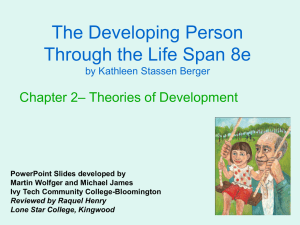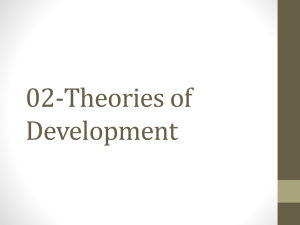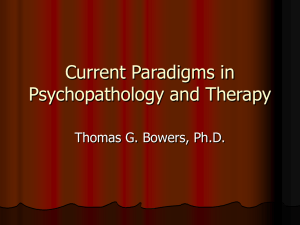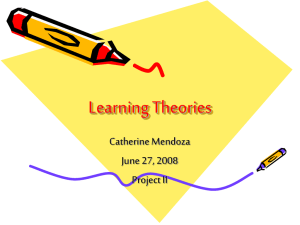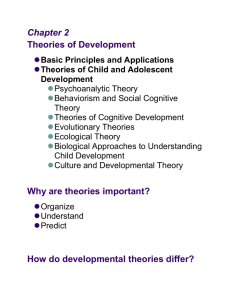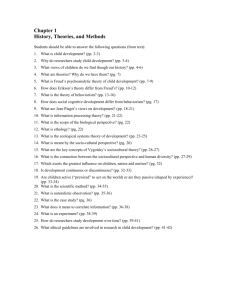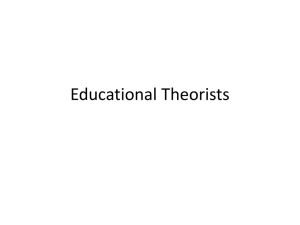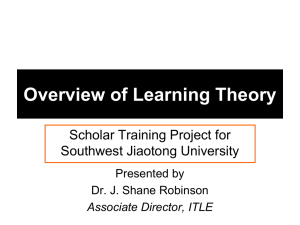Chapter 2: Theories of Development What Theories Do
advertisement
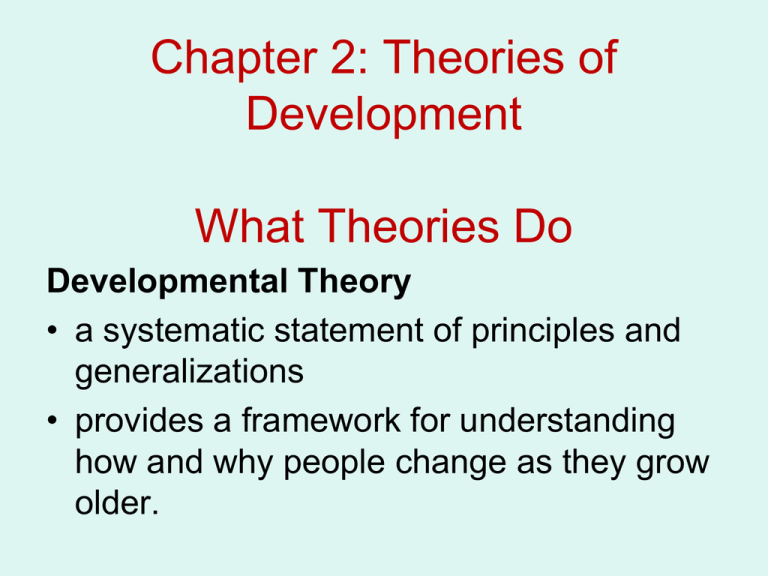
Chapter 2: Theories of Development What Theories Do Developmental Theory • a systematic statement of principles and generalizations • provides a framework for understanding how and why people change as they grow older. Grand Theories • Includes Psychoanalytic, Behavioral, and Cognitive theories. • All three are comprehensive, enduring, and widely applied. Psychoanalytic Theory • A theory of human development that holds that irrational, unconscious drives and motives, often originating in childhood, underlie human behavior. • Psychoanalytic theory originated with Sigmund Freud (1856– 1939) Psychoanalytic Theory Erickson’s Ideas • Erik Erikson (1902–1994) • Described eight developmental stages, each characterized by a challenging developmental crisis. • His first five stages build on Freud’s theory; but he also described three adult stages. Psychoanalytic Theory Behaviorism • A theory of human development that studies observable behavior. • Also called learning theory as it describes the laws and processes by which behavior is learned. • Conditioning - the processes by which responses become linked to particular stimuli and learning takes place. Behaviorism Classical conditioning - Ivan Pavlov (1849-1936) • (also called respondent conditioning), a process in which a person or animal learns to associate a neutral stimulus with a meaningful stimulus, gradually reacting to the neutral stimulus with the same response as to the meaningful one. Behaviorism Operant conditioning - B.F. Skinner (1904–1990) • (also called instrumental conditioning) a learning process in which a particular action is followed either by something desired or by something unwanted. Operant Conditioning Reinforcement • Increasing the probability of a response • A technique for conditioning behavior Examples: -Food for a hungry animal -A pat on the back for a job well done -An A for a well written paper Behaviorism Social Learning Theory- Albert Bandura (b. 1925) • An extension of behaviorism that emphasizes the influence that other people have over a person’s behavior. • Modeling- people learn by observing other people and then copying them. • Self-efficacy- how effective people think they are when it comes to changing themselves or altering their social context. Cognitive Theory • Thoughts and expectations profoundly affect action. • Focuses on changes in how people think over time. • Jean Piaget (1896–1980) Cognitive Theory Cognitive Theory Cognitive Equilibrium • • • • • A state of mental balance, no confusion Interpret new ideas through past ideas Needed for intellectual advancement Easy equilibrium not always possible If new experience is not understandable, cognitive disequilibrium can occur Cognitive Theory Two types of cognitive adaptation: • Assimilation - new experiences are interpreted to fit into, or assimilate with, old ideas • Accommodation - old ideas are restructured to include, or accommodate, new experiences Cognitive Theory Information Processing • Not a single theory but a framework • Inspired by how a computer works • How people think before they respond • How attention and thought affects mental function • Relationship between one person’s thinking and another’s Newer Theories • • • • Sociocultural Theory Lev Vygotsky (1896-1934) Development results from a person’s interaction with their social and cultural surroundings Culture is integral to development Apprenticeship in thinking: how cognition is “taught” by the older and more skilled Sociocultural Theory Zone of proximal development • Made up of the skills, knowledge, and concepts that the learner is close to acquiring – Learner needs help to master – Learning must be individualized The Universal Perspective • • • • Humanism Abraham Maslow (1908-1970), Carl Rogers (1902-1987) Stresses the potential of humans for good All people have the same needs Emphasize what people have in common The Universal Perspective • • • • • Evolutionary Theory Based on Darwin’s ideas Very controversial in psychological circles Humans are more alike than different Human development influenced by drives to survive and reproduce Selective adaptation: process by which people adapt to their environment What Theories Contribute • Eclectic perspective – The approach taken by most developmentalists – Aspects of each of the various theories of development are applied rather than adhering exclusively to one What Theories Contribute
